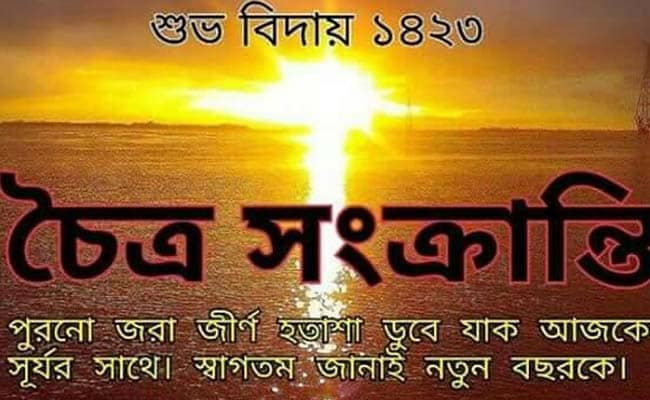
Pohela Boishakh 2017: History and how it is celebrated.
New Delhi:
Pohela Boishakh or Bengali New Year is the traditional new year day of the Bengali people. It is celebrated on 14 April as a national holiday in Bangladesh, and on 15 April in India. The festival date is set according to the lunisolar Bengali calendar as the first day of its first month Baishakh. In Bengali, Pohela stands for 'first' and Boishakh is first month of Bengali calendar. The festival is celebrated with processions, fairs and family time. The traditional greeting for Bengali New Year is Shubho Nabobarsho which is means Happy New Year.
History of Pohela Boishakh
Akbar the Mughal emperor was collecting the tax under his reign from 1556 to 1609. On the times, the economy was fully depended on the Agricultural productions. That was the time; the Arabic or Hijri year didn't match for collecting the Agricultural products as the Tax.
Then he made a new calendar to collect the Tax from the people who were fully depended on the Agricultural products. That Calendar was named as Bangla calendar and the 1st day of this calendar known as the Pohela Boishakh.
 Celebration of Pohela Boishakh
Celebration of Pohela Boishakh
Like the new year day in the rest of India, Bengali families clean their house and decorate them with alpana (rangoli). In the center of the alpana color pattern, they place a earthen pot, filled with water, capped with mango leaves and marked with auspicious Hindu red and white swastika sign. Many people visit the nearby river to say their prayers and take a ritual bath.
History of Pohela Boishakh
Akbar the Mughal emperor was collecting the tax under his reign from 1556 to 1609. On the times, the economy was fully depended on the Agricultural productions. That was the time; the Arabic or Hijri year didn't match for collecting the Agricultural products as the Tax.
Then he made a new calendar to collect the Tax from the people who were fully depended on the Agricultural products. That Calendar was named as Bangla calendar and the 1st day of this calendar known as the Pohela Boishakh.

Pohela Boishakh 2017: It is also considered auspicious to start new businesses.
Like the new year day in the rest of India, Bengali families clean their house and decorate them with alpana (rangoli). In the center of the alpana color pattern, they place a earthen pot, filled with water, capped with mango leaves and marked with auspicious Hindu red and white swastika sign. Many people visit the nearby river to say their prayers and take a ritual bath.
Track Latest News Live on NDTV.com and get news updates from India and around the world

